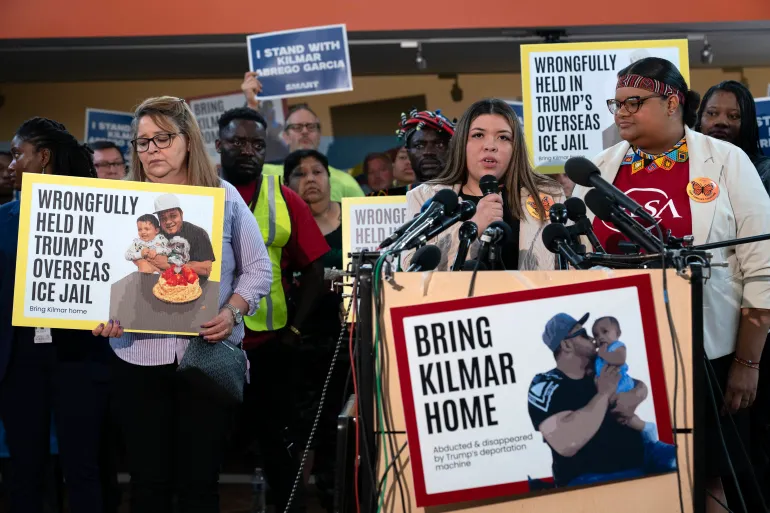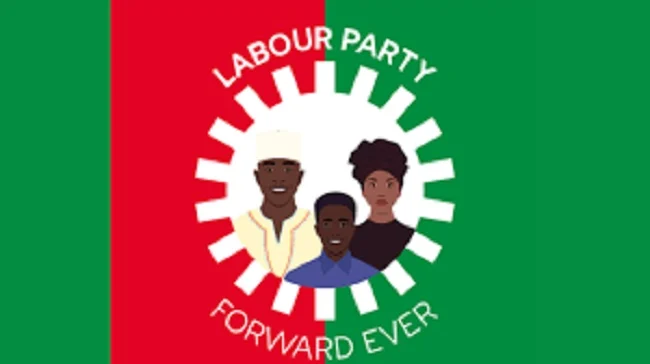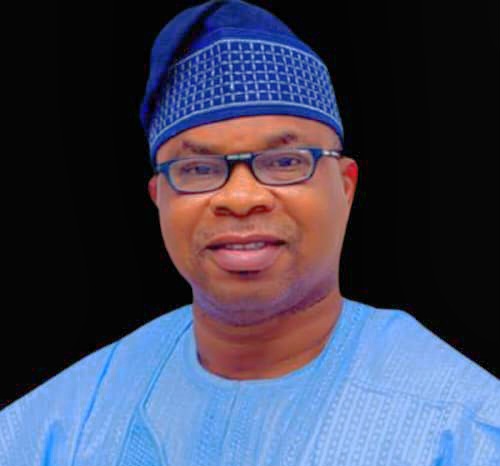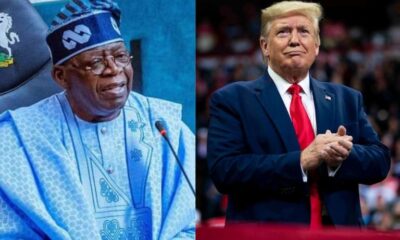Opinion
Why Trump And Bukele Are Destroying Kilmar Abrego Garcia’s Life

The two want to block all channels for legally challenging their lucrative prison scheme.
In March, the United States government deported to El Salvador 29-year-old Kilmar Abrego Garcia, a Salvadoran national who had lived and worked in the US for almost half his life. Little did he know that he would soon be the face of US President Donald Trump’s sinisterly exuberant mass deportation campaign.
Married to US citizen Jennifer Vasquez Sura, Abrego Garcia was detained while driving in Maryland with the couple’s five-year-old autistic son, who got to witness his father’s capture by the US forces of law and order and has apparently been severely traumatised as a result. In a subsequent court affidavit, Vasquez Sura said her son, who cannot speak, had been “very distressed” by the “sudden disappearance of his father”, crying more than usual and “finding Kilmar’s work shirts and smelling them, to smell Kilmar’s familiar scent”.
Of course, tearing families apart and traumatising children has long been par for the bipartisan course in everyone’s favourite “land of the free”, although Trump has certainly made more of a sensational spectacle out of it than his Democratic predecessors, Joe Biden and Barack Obama. Anyway, there is nothing like sowing a bunch of fear and psychological trauma in the name of national security, right?
Abrego Garcia was deported to El Salvador along with more than 200 other people, who shared the honour of serving as demonised guinea pigs in the Trump administration’s current experiments in sadistic countermigration policy. The deportees were swiftly interned in the Terrorism Confinement Center (CECOT), the notorious mega-prison built by Nayib Bukele, El Salvador’s self-described “coolest dictator in the world”. The facility houses thousands of people arrested under the nationwide “state of emergency”, which was declared in 2022 and shows no sign of abating.
Under the pretence of fighting a war on gangs, Bukele has imprisoned more than 85,000 Salvadorans – over 1 percent of the country’s population – in an array of jails that often function as blackholes in terms of indefinitely disappearing human beings as well as any notion of human and legal rights. And now that incoming US funds and deportees have boosted El Salvador’s international carceral clout along with Bukele’s tough-guy image, there is even less of a rush to end the “emergency”.
Meanwhile, the case of Abrego Garcia in particular has provided both Trump and Bukele with an extended opportunity to showcase their mutual passion for sociopathy and disdain for the law. As it so happens, Abrego Garcia’s deportation to El Salvador occurred in direct violation of a 2019 ruling by a US immigration judge, according to which he could not be deported to his native country on account of the dangers that such a move would pose to his life.
Indeed, Abrego Garcia fled to the US as a teenager, precisely out of fear for his life following gang threats to his family. And although the US government was quickly forced to acknowledge that his deportation in March had occurred “because of an administrative error”, the Trump-Bukele team remains determined not to rectify it.
After all, this would set a dangerous precedent in suggesting that the possibility of recourse to justice does in fact exist, and that asylum seekers in the US should not have to live in terror of being spontaneously disappeared to El Salvador by “administrative error”.
As per a recent New York Times article exposing the details of the debate within the Trump administration over how to manage the PR side of the Abrego Garcia blunder before it became public, officials from the US Department of Homeland Security (DHS) “discussed trying to portray Mr. Abrego Garcia as a ‘leader’ of the violent street gang MS-13, even though they could find no evidence to support the claim”.
But a lack of evidence has never stopped folks who are not concerned with facts and reality in the first place. Trump officials have continued to insist on Abrego Garcia’s affiliation with MS-13, while the president himself has unabashedly invoked a doctored photograph of tattoos on the man’s knuckles. The administration has also relied heavily on the fact that, in 2019, the police department in Prince George’s County, Maryland, decided that Abrego Garcia was a gang member because he was wearing a Chicago Bulls hat, among other oh-so-incriminating behaviour.
To be sure, the frequency with which US law enforcement outfits cite Chicago Bulls merchandise as alleged proof of gang membership would be laughable given the US basketball team’s massive domestic and international fanbase – if, that is, such preposterous profiling tendencies did not directly translate into physical and psychological torment for Abrego Garcia and countless other individuals.
In April, the US Supreme Court ordered the Trump administration to “facilitate” Abrego Garcia’s return to the US. In addition to thus far failing to comply with that order, the administration has gone to ludicrous lengths to defy a separate order from US District Judge Paula Xinis that it provide details about what exactly it is doing to secure Abrego Garcia’s release.
Apparently irked by Judge Xinis’s pushiness, Trump administration officials then went with the good old “state secrets” excuse, which would enable the withholding of information regarding Abrego Garcia’s case in order to safeguard “national security” and the “safety of the American people”, as DHS spokeswoman Tricia McLaughlin put it.
Bukele, for his part, has handled the Abrego Garcia situation with a petulant and vengeful machismo befitting the world’s “coolest dictator”, taking to X to ridicule the wrongfully abducted and imprisoned man. During an April visit to his partner in crime in the Oval Office in Washington, Bukele made clear to reporters that he would not be lifting a finger on Abrego Garcia’s behalf: “How can I smuggle a terrorist into the United States?”
Speaking of terrorism, it is worth recalling that, long before the current “state of emergency” in El Salvador, the US had an outsized hand in supporting right-wing state terror in the country, where the civil war of 1979-92 killed more than 75,000 people.
The majority of wartime atrocities were committed by the US-backed Salvadoran military and allied death squads, and countless Salvadorans fled north to the US, where MS-13 and other gangs formed as a means of communal self-defence. Following the war’s end, the US undertook the mass deportation of gang members to a freshly devastated nation, paving the way for continued violence, migration, and deportation and culminating, of course, in the world’s coolest dictatorship.
As they say, nothing fuels the consolidation of power and evisceration of rights like a solid “terrorist” enemy – and at the present moment, Abrego Garcia holds the dubious distinction of serving as that enemy for not one but two sociopathic heads of state. At the end of the day, though, Abrego Garcia is no Osama bin Laden; he is just a random guy whose calculated torment is meant as a warning to anyone who might be feeling too confident in the rule of law.
Trump has already proposed sending US citizens to El Salvador for incarceration, as well – and to hell with any semblance of legality. To that end, the president has proposed that Bukele build more prisons, a project that presumably will not require much arm-twisting.
Now, as the US government goes about annihilating the rights of foreign nationals and legal citizens alike, it is safe to assume that no one is safe.
Aljazeera.com

Opinion
Edo State To Spend N1billion On Armoured Car For Speaker, N4.6billion On Vehicles For Lawmakers

The budget also reveals that N4.6 billion is planned for vehicles for the 25 members of the State House of Assembly.
Reporters’ review of the Edo State approved budget for 2026 shows that N1billion has been allocated to purchase an armoured vehicle for the Speaker of the State House of Assembly.
The budget also reveals that N4.6 billion is planned for vehicles for the 25 members of the State House of Assembly.
Also, N50million is planned for the purchase of refrigerators and other equipment for four directors. The House of Assembly Commission also plans to spend 200 million naira on roof and window replacement for its office building.
Earlier, a civic accountability group, MonITng, raised concerns over the execution of a multi-million-naira education project in Edo State, citing poor quality, procurement irregularities, and a recurring pattern of questionable contract awards.
“A project titled ‘Building of Blocks of Classrooms at Ojah Comprehensive High School, Akoko LGA, Edo State’ with project code ZIP20240448, valued at ₦222,000,000.00, and awarded under the Federal Polytechnic Auchi, Federal Ministry of Education, has raised serious concerns about the quality of execution, contract pricing, and procurement integrity.”
According to MonITng, its team tracked and inspected the project site. “Our team tracked and visited the project site and confirmed that although the classrooms were completed, they were poorly constructed.”
The group further noted: “The structure lacks basic finishing elements such as landscaping, proper drainage, and standard finishing works, all of which should have been included and adequately executed, given the huge sum budgeted for the project.”
It added that “the poor quality of work raises questions about project supervision, contract oversight, and how the allocated funds were spent.”
MonITng also linked the project to a contractor allegedly tied to multiple controversial contracts. “Even more troubling is the pattern we uncovered. The project was executed by Sam Sedi Nig. LTD, a company that has consistently received major contracts facilitated by Senator Adams Oshiomhole.”
The group claimed that “this same contractor handled the abandoned ERGP20245252 project, Construction of Warake to Ivbiaro Road in Owan East LGA, valued at ₦200,000,000.00, which remains incomplete despite significant disbursements.”
“Additionally, the same company implemented a controversial agricultural empowerment programme in Etsako communities, also facilitated by Senator Oshiomhole.”
MonITng alleged that “the recurring involvement of this contractor in multiple projects, combined with substandard delivery and abandoned works, suggests a pattern of procurement manipulation, inflated contracts, and possible diversion of public resources.”
It added that “the situation reflects how public projects, although completed on paper, often fail to deliver a meaningful impact due to corruption, poor supervision, and a lack of accountability.”
Opinion
APC E-registration Plot To Manipulate 2027 Polls – Ogun LP

The Ogun State chapter of the Labour Party has accused the All Progressives Congress of using its ongoing electronic membership registration to allegedly manipulate figures ahead of the 2027 general elections.
In a statement issued on Wednesday, the state chairman of the Labour Party, Chief Oluwabukola Soyoye, claimed that the APC’s e-registration exercise was designed to digitally inflate its membership strength and project a false image of popularity in the state.
Soyoye alleged that the ruling party had resorted to electronic registration because it could no longer mobilise people openly, insisting that the administration of Governor Dapo Abiodun had suffered widespread rejection due to what he described as underperformance.
According to him, the APC’s e-registration, presented as a routine membership drive, was in reality “a political referendum that exposes the deep rejection of Governor Dapo Abiodun and his black-market style of governance by the people of Ogun State.
“The people of Ogun are now wiser. They have deliberately refused to participate in any open, physical APC registration because they know the ruling party has failed them,” Soyoye said.
“That is why the APC has resorted to this so-called electronic registration — a system that allows figures to be fabricated behind closed doors without the presence of real members.”
The LP further alleged that the electronic platform could be used to manipulate membership data, inflate figures and create a misleading narrative of political dominance ahead of 2027
“What we are witnessing is not a genuine political exercise but a fraudulent digital operation designed to manufacture legitimacy for a government that has lost the confidence of the people,” Soyoye added.
Opinion
Let These Campaigns Of Calumny Against AMBO Stop Forthwith

By Kola Odepeju
“Calumny Is Only The Noise Of Madmen” –Diogenes
As Osun state gubernatorial election draws nearer, we’re now at the dawn of the campaigns for the coming election and so as characteristic of Nigeria’s democracy, wrong accusations, blackmails, character assassinations and all manner of negative campaigns aimed at demarketing the most popular candidate with the highest chances of coasting home to victory in a major election of this nature, must surface. And so in our own dear Osun state here this ugly trend has started surfacing. The mudslinging that has started from Governor Ademola Adeleke’s Accord Party’s camp against the APC gubernatorial candidate, Asiwaju Munirudeen Bola Oyebamiji AMBO is ‘normal’ and expected because with the massive support for AMBO across the nook and cranny of the state, it’s crystal clear that he’s the candidate to beat.
As mentioned above, a candidate to beat in any major election is bound to face vilifications by his opponents who see him as a threat and a stumbling block against the success of their own ambitions. Therefore given the nature of our politics in this part of the world, the negative campaigns that have started against AMBO are no surprise. We witnessed the same thing against the incumbent president, Asiwaju Bola Tinubu during the 2023 electioneering campaigns for the office of the country’s president. But against all odds, Asiwaju Tinubu emerged victorious. So as Asiwaju Tinubu emerged victorious in 2023, l have that strong conviction that our own Asiwaju Bola Oyebamiji will also become victorious in the coming August gubernatorial election in the state irrespective of whatever negative campaigns that may come up against him. This is because the AMBO governorship project is divinely ordained.
Amongst other attacks that are still likely to come up against him as we face the election and as the election faces us, we have heard from those who are afraid of losing power that AMBO is the architect of half salaries in Osun (as if he was the governor in that era). We have also heard from them that he’s not youth-friendly. The spokesperson to governor Adeleke, Malam Olawale Rasheed also amplified these two negative points in his latest article aimed at demarketing AMBO. Like I mentioned, the negative campaigns have just started. We are still going to hear more. I wonder why people cannot engage in issues-based campaigns instead of vilifying candidates.
Ambo has told Osun youths the program he has for them. He has promised to take care of them. And as a God-fearing and honest leader who keeps to his words, l believe he will not renege on his promise for the youths and also his promises for Osun people generally. So let those who revel in vilifying a credible candidate like AMBO tell Osun youths the programs they have for them rather than calumniating a visionary and capable leader who has what it takes to deliver the goods. Of course AMBO – being a focused leader – needs not to bother himself about the negative campaigns being circulated against him by his political detractors because William Shakespeare had for long told us that “*Be thou as chaste as ice, and as pure as snow, thou shall not escape calumny*”. And George Washington also mentioned it that “*Silence is the best answer to false accusations*”.
Finally, the Yorubas in their words do say that “maligning the honey doesn’t reduce its sweetness”. No matter the level of negative campaigns against the APC gubernatorial candidate towards the election, it won’t reduce the love the Osun people have for him while it won’t deter them from casting their votes for him in the upcoming gubernatorial election in the state. He will surely come out victorious by the special Grace of God Almighty 🙏. For, Vox populi vox dei. AMBO should continue on the path of issues-based campaigns and close his eyes against malignant talks by those who are already on their way out of power.
● Odepeju, newspaper columnist and political activist, writes from Iragbiji, Osun state.
-

 Politics2 days ago
Politics2 days agoAssembly Confirms Popular Redeemed Pastor As Deputy Governor
-

 Foreign2 days ago
Foreign2 days agoCabinet Reshuffle: President Sacks Finance Minister
-

 Business2 days ago
Business2 days agoJUST IN: 13 Banks May Shut Down In March As CBN Confirms 20 Safe For Recapitalisation Deadline
-

 Politics9 hours ago
Politics9 hours agoBREAKING: “Serial Disrespect” Sparks Drama As Senate Order Arrest Of Tinubu’s Appointee
-

 Politics10 hours ago
Politics10 hours agoOpposition Leaders Urge N’Assembly To Begin Fresh Electoral Act Amendment
-

 Opinion9 hours ago
Opinion9 hours agoEdo State To Spend N1billion On Armoured Car For Speaker, N4.6billion On Vehicles For Lawmakers





